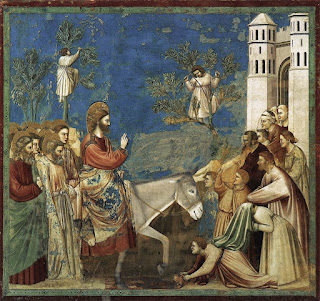The Joy of the Cross
PALM SUNDAY OF THE LORD’S PASSION (C)
click here for readings
Palm Sunday and Passion Sunday: these two names reflect two very different aspects of the liturgy, unique in that two different gospel readings are proclaimed. In churches all over the world people will gather outside the church proper to begin the liturgical celebration in joy and triumph. We will read from Luke 19:28-40, of Jesus’ triumphal entry into Jerusalem, riding on an ass. As he rides along people spread their cloaks out on the road for him, and “the whole multitude of his disciples” praises God with joy and sings, “Blessed is the king who comes in the name of the Lord.”
After the gospel reading we are given blessed palms and asked to lend our voices to the praising crowd, as we sing, “Hosanna to the Son of David, blessed is he who comes in the name of the Lord, the King of Israel!”
Inside the church, though, is another matter. Turn a page or two in Luke’s gospel. Now we hear of the Last Supper, Jesus’s arrest and trial, his passion and his death. In the gospel reading, the words of the gathered crowd cry, “Crucify him! Crucify him!” We choose Barabbas over Jesus. The same crowd that moments ago sang His praises now condemn Him.
Isn’t this exactly like the human heart? Aren’t we all too often like Peter, swearing that we would never deny our Lord, but then before the cock crows find we have done it not once, but multiple times?
I know some people who break down into tears at the words, “Crucify Him!” It breaks their hearts. It hurts because we are the ones who crucified Christ. We are the ones who are responsible for His suffering and His death — you and me, and every other person who has ever sinned, which is to say everyone. We need to be reminded of this not simply so we can express gratitude (though we should), but so that we can feel true sorrow for our part in Christ’s passion. It should break your heart. It should hurt.
But Jesus doesn’t just suffer because of us; he suffers for us. Christ is not only crucified for us; he asks us to join him on the cross. “If you would be my disciples, you must take up your cross and follow me.” Being a Christian means we must suffer on the cross as well. Jesus did not come to end all suffering; He came to transform suffering into salvation. The way this is achieved is to join our suffering to His.
When we are baptized, we are sacramentally joined to Christ’s death and resurrection. From that moment on, each occasion of suffering in our life can draw us closer in communion with our Lord’s passion. This all sounds rather grim, I know. But the Passion is not the end of the story. Palm Sunday is followed by Easter. When we join our suffering to the Lord’s, we join with the One who conquered death. The more we die with Christ, the more we will rise with Him. This is the great joy of the cross.
Hanging from the cross, beaten and bruised, thirsty, humiliated, and in excruciating pain, our Lord uses one of His last breaths to exclaim, “My God, my god, why have you abandoned me?” Our Lord quotes Psalm 22. The psalm is prophetic. Composed by divine inspiration hundreds of years before the Crucifixion, the psalmist speaks of being mocked, having his hands and feet pierced, surrounded by evil doers, and having lots cast for his garments — all things that describe the suffering of the Christ. But then the psalmist proclaims, “But you, O Lord, be not far from me; O my help, hasten to aid me. I will proclaim your name to my brethren; in the midst of the assembly I will praise you…”
Jesus was never and could never be separated from God. And God is never far from those who suffer with His Son. The closer you come to the cross, the closer you draw to God. Blessed is he who comes in the name of the Lord, the King of Israel, and the Suffering Servant.

